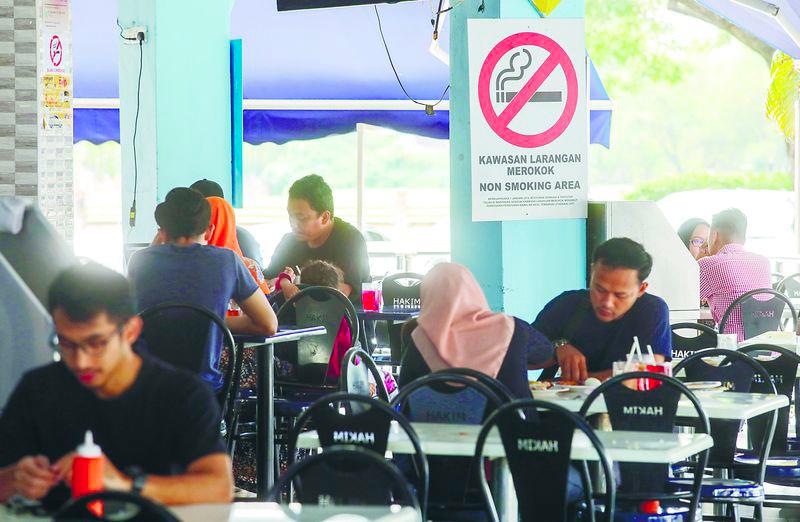PETALING JAYA: Despite the no-smoking ruling being enforced at all eateries and restaurants nationwide since Jan 1, 2019, 77.6% of those aged 15 and above claim they were exposed to secondhand smoke in such places.
This is according to the Global Adults Tobacco Survey Malaysia 2023, which involved 5,780 households nationwide.
“Another 29.2% said they were exposed to secondhand smoke in government buildings, 19% on public transport and 18.6% in healthcare facilities.”
Universiti Kebangsaan Malaysia Public Health Medicine specialist Prof Dr Sharifa Ezat Wan Puteh said there is no difference between what smokers inhale and those inhaling their secondhand smoke.
“The US National Cancer Institute has identified more than 7,000 chemicals in secondhand tobacco smoke and at least 69 of these chemicals are known to cause cancer.
ALSO READ: ‘Smoking link to cancer indisputable’
“While Malaysia has smoking cessation strategies, they face significant challenges due to the widespread availability of illicit cigarettes and use of vape products by the underage.”
Sharifa said both these issues encourage youth to experiment with tobacco and vape, ultimately developing an addiction to them and disrupting government efforts to stamp out such habits.
“Effective regulations and enforcement are crucial to address the problem. Promoting the proper use of alternative nicotine products can help reduce the tobacco epidemic.”
Sharifa said it is a known fact that secondhand smoke poses serious risks to vulnerable individuals, including pregnant women, infants, the elderly and those with pre-existing health conditions.
“It can result in babies being born underweight and having developmental problems. There is also a 23% increased risk of stillbirth and 13% higher risk of congenital malformations.”
ALSO READ: Call to reinstate nicotine in Poisons Act
Sharifa said the New Policy Outline 2021 by the World Health Organisation reported secondhand smoke killed around 1.2 million people annually, of which 65,000 were premature and preventable deaths among children and adolescents under 15 years.
She said exposure to secondhand smoke leads to tobacco-related diseases (TRD) and contributes to the development of non-communicable diseases such as heart disease, cancer or chronic respiratory disease.
“The government spends millions annually treating TRD in Malaysia. Most smokers come from the B40 and middle-income groups, which worsens their socioeconomic and health issues. There is no safe level of exposure to secondhand smoke. Since the 1960s, about 2.5 million individuals who did not smoke died from health problems caused by exposure to secondhand smoke.”
Meanwhile, the Malaysian Muslim Restaurant Owners Association said it is concerned about secondhand smoke and supports the government decision to enforce smoking bans in restaurants.
ALSO READ: RM1.4 million in compounds issued for smoking offences in March - MOH
“While some customers support it, others become aggressive and threaten to throw hot tea on the faces of our workers when confronted about their smoking,” said its president Datuk Jawahar Ali Taib Khan.
Its vice-president Abdul Mukhtahir Mohd Ibrahim said continuous education on the dangers of smoking is needed as some individuals are not adhering to the smoking ban in restaurants.
“During our meetings with the government, we have emphasised Malaysia is a democratic country, in which the rights of smokers should also be respected. We even proposed the creation of designated ventilated smoking areas within our premises as a temporary solution, which would be eliminated over time, and to increase the distance between smoking and non-smoking areas.”
He said educating the public about smoking will make them aware of the impact of their actions and the risk of secondhand smoke.









